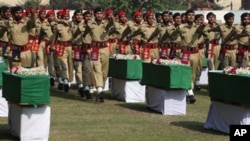Pakistan's decision to boycott an international conference on Afghanistan’s future is jeopardizing the meeting's success. The conference is scheduled to begin Monday in Bonn, Germany.
Anger in Pakistan continues to grow over the deaths of 24 Pakistani soldiers in recent NATO airstrikes along the border with Afghanistan.
Pakistan has blocked critical NATO supply routes into Afghanistan and ordered U.S. personnel to evacuate an air base believed to be used for launching drones that fire missiles on militant targets.
“If there is going to be a peaceful resolution to the conflict in Afghanistan, Pakistan is going to have to play a constructive role in that process,” said Andrew Wilder, an expert on South Asia at the U.S. Institute of Peace.
The Pakistani soldiers' deaths have dealt a blow to U.S.-Pakistan relations.
Islamabad has dismissed international calls to reconsider its boycott of the Bonn conference.
Coalition forces in Afghanistan are scheduled to withdraw in the next few years, and a goal of the talks is to develop strategies for a smooth transition.
“We believe it is very much in Pakistan’s interest to attend the Bonn conference because the focus of that is all about trying to build a more stable and peaceful Afghanistan,” said State Department spokesman Mark Toner.
Ten years ago, diplomats attended a conference in Bonn and appointed a transitional government in Afghanistan, following the U.S.-led invasion in response to the September 11 terrorist attacks.
This time, the transfer of security responsibility to Afghan forces is on the agenda.
The complete turnover will depend on a number of factors, says Ali Jalai, a professor at the National Defense University in Washington.
“One is the building of its capacity until 2014, the other is the progress toward reconciliation with the opposition forces fighting against the Afghan government, and third is the cooperation from the regional countries, particularly Pakistan,” Jalali said.
Political reconciliation between the Taliban and the Afghan government is another issue to be discussed in Bonn.
“Everybody is talking about how you meet the Taliban and talk to them now, and it’s extremely difficult. In 2002, it would have been very easy. We failed to do that. That was a very, very big failure,” said Lakhdar Brahimi, a former U.N. special envoy in Afghanistan.
Brahimi says in the years after the Taliban were driven from power there were not enough international troops to secure the country, allowing the insurgent group to rebuild. He calls that a major mistake of the first Bonn conference and says the international community is to blame.
“We helped the Afghans put this program together, we stopped helping them properly implementing it, by not paying attention to the most important aspect of the process, which is security,” Brahimi said.
The role of international military forces is also on the agenda in Bonn, along with foreign aid after the 2014 deadline for combat soldiers to leave Afghanistan.
Pakistani Boycott Jeopardizes Conference on Afghanistan




